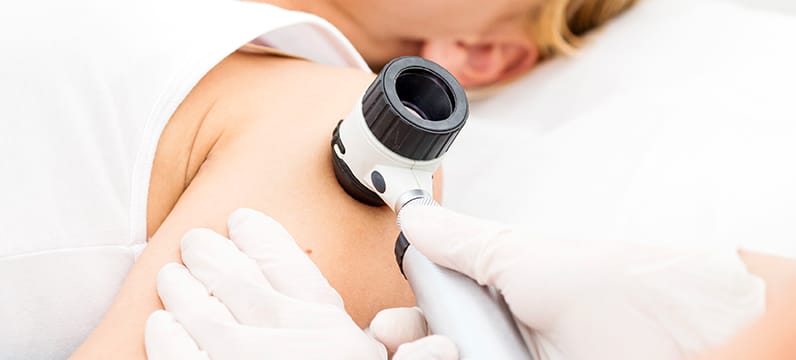Clinical Dermatology & Medical Dermatology in South Miami, FL

Skin Center of South Miami is home to dermatologists who are experts in clinical dermatology, including skin cancer screening, Mohs surgery, acne treatment, mole checks, sun damage correction, skin allergy treatment, and other medical dermatology concerns. Whether you are suffering from a minor skin irritation, a severe reaction, possible skin cancer or something else, our skin doctors can provide the compassionate care you need to accurately diagnose and treat your dermatology issue.
We treat each and every patient as a unique individual and take time to address your concerns and questions. Put simply, we take our patients seriously.
What conditions can a clinical dermatologist treat?
At Skin Center of South Miami, our top dermatologists specialize in the diagnosis and treatment of a wide range of clinical conditions affecting the skin, hair and nails, including:
- Skin cancer
- Moles
- Skin growths
- Skin allergies
- Nail fungus
- Skin discoloration
- Sun damage
- Hair loss
- Warts
- Ringworm
- Rashes
- Hives
- Skin infections
- Itching
- Spider veins
- Excessive sweating
Click on the buttons below to learn more about the clinical dermatology conditions we treat & services we offer.
Why Choose Skin Center of South Miami
At the Skin Center of South Miami, we provide exceptional dermatological care tailored to your unique needs. Here’s why patients trust us for their clinical and medical dermatology needs:
- Top Skin Doctors: Our team includes highly regarded dermatologists who diagnose and treat all skin conditions. With advanced training and a focus on excellence, our doctors deliver top-tier care you can rely on.
- Personalized and Compassionate Care: We understand that every patient is unique. That’s why we listen to your concerns, thoroughly evaluate your condition, and ensure your treatment plan fits your lifestyle and goals—all in a warm and welcoming environment.
- Latest Treatment Options: We stay at the forefront of dermatological advancements, ensuring you receive the most effective and innovative care, from cutting-edge diagnostic tools to state-of-the-art treatments.
- Experienced Physicians: Our seasoned dermatologists bring years of experience and knowledge to every consultation. You can trust our team to deliver skilled, thorough care, no matter how simple or complex your skin condition.
Frequently Asked Questions (FAQs)
What is the difference between clinical dermatology and medical dermatology?
Clinical dermatology focuses on diagnosing and treating skin, hair, and nail conditions that affect overall health. Medical dermatology addresses conditions involving complex medical treatments, such as autoimmune skin diseases, severe acne, or skin cancers. Both aim to improve skin health but differ in the scope and complexity of conditions treated.
How often should I get a skin cancer screening?
You should get a skin cancer screening at least once a year, especially if you have risk factors such as fair skin, repeated sunburns, constant sun exposure, or a family history of skin cancer. Your dermatologist may recommend screenings more often if you are at higher risk.
What does a comprehensive skin examination involve?
A comprehensive skin examination involves thoroughly inspecting your skin, scalp, and nails for unusual lesions, moles, or discoloration. The dermatologist will assess the size, shape, and color of any marks and may use a dermatoscope for a closer look. They may recommend further tests, such as a biopsy, for accurate diagnosis.
What should I expect during my first visit to a dermatologist?
The dermatologist will look at your medical history and discuss your concerns during your first visit. They examine your skin and may recommend tests, treatments, or a follow-up visit. Be prepared to share information about your symptoms, skincare routine, medications, and previous treatments.
When should I see a dermatologist instead of my primary care doctor for skin concerns?
You should see a dermatologist if you have persistent or unusual skin issues, such as severe acne, chronic rashes, unexplained hair loss, or moles with size, shape, or color changes. Dermatologists specialize in diagnosing and treating complex skin conditions and can provide more advanced care than a primary care doctor.
How do dermatologists diagnose skin conditions?
Dermatologists use a combination of patient history, visual examination, and diagnostic tests to identify skin conditions. They may use tools like a dermatoscope or perform a skin biopsy to examine tissue samples under a microscope for a more accurate diagnosis.
Schedule Your Clinical Dermatology Consultation In South Miami!
Be sure to dial 305-740-6181 today or fill out our contact form for your one-on-one clinical dermatology consultation with our seasoned dermatologists. Our Miami office looks forward to serving you!